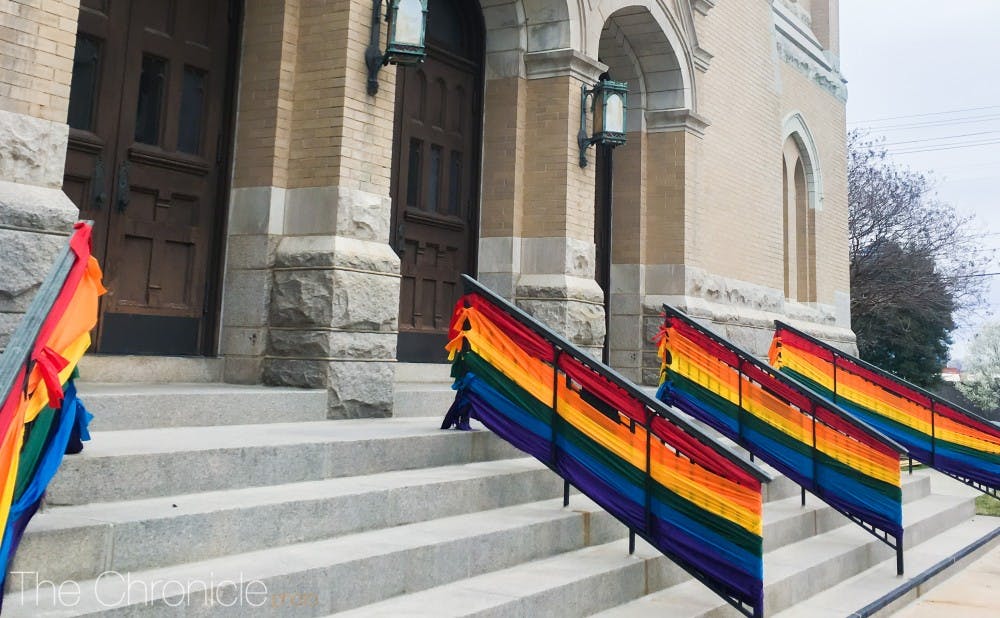Divinity School faculty are conflicted about the planned split of the United Methodist Church.
In early January, reports suggested that the United Methodist Church will likely separate into two or more factions because of disagreements over LGBTQ+ rights. Divinity School administrators and faculty have conflicting opinions about whether the likelihood of the split has been exaggerated. One faculty member suggested that the schism could harm the school’s funding, but several others added that reports of a split were overstated.
Will Willimon, professor of the practice of Christian ministry, speculated that the Divinity School could lose $3 million per year—the money it receives from the Ministerial Education Fund which is nearly 10% of the Divinity School’s budget—as a result of the division.
At the UMC General Conference in February 2019, worldwide delegates from the UMC voted to uphold and strengthen its ban on the ordination and marriage of LGBTQ+ people. In response to the turmoil caused by this vote, 16 bishops and other church leaders created a committee to research and consider the best path forward for the church.
This group of leaders determined that the Church should be split into at least two factions: one “traditionalist” body that would continue the ban on LGBTQ+ marriage and clergy, and one that is openly inclusive and affirming.
Under this proposed plan, individual churches would decide with the help of their congregations and leadership whether they want to join the “traditionalist” faction or remain in the main United Methodist Church. These decisions would be due by 2024.
Leaders from the traditionalist and more progressive factions alike have expressed their approval of the plan, which has led to some sources to claim that the division is likely to occur.
A delegate to the UMC General Conference since 2012, Edgardo Colón-Emeric, Irene and William McCutchen associate professor of reconciliation and theology, argued that the proposal has been taken out of context by the media. In reality, he said, it’s too early to tell how or even whether the church will split.
L. Gregory Jones, dean of the Divinity School, agreed with Colón-Emeric, writing in an email that “the ‘news’ from [early January] was the latest proposal that has been floated for a path forward.”
“It is premature to assess what might happen at the General Conference in May,” Jones said.
Colón-Emeric, who is one of 16 delegates to the UMC General Conference elected by the North Carolina Annual Conference of the UMC, said that he does not yet know how he will use his vote. He said he’s still in the stage of reading, thinking, praying and listening to his constituents.
“At one level, of course, the division is something to be cried and lamented. At another level, some of the divisions have already taken place in practice if not in law,” Colón-Emeric said.
Laceye Warner, Royce and Jane Reynolds associate professor of the practice of evangelism and Methodist studies, is a member of Texas’s Annual Conference of the UMC and will also be a delegate at this year’s UMC General Conference.
“It is still very early to discern what will happen related to the UMC. There are numerous proposals and ongoing conversations,” she wrote in an email to The Chronicle.
Warner did not answer The Chronicle’s question regarding her opinion on the potential division.
A UMC bishop and former dean of Duke Chapel, Willimon expressed a starkly different sentiment than Warner, Colón-Emeric and Jones, explaining that he “[wishes] the media had misrepresented it.”
Willimon conceded that the recently-floated plan is only a proposal and not a decision by the UMC General Conference. He thinks that the church will split, but that it isn’t clear to him how many factions will emerge from the division.
There are currently 13 United Methodist seminaries, many of which are already struggling to remain afloat, Willimon said. No more than four would survive a split, he estimated.
“Part of being in a church is to be with people that you don’t agree with and many of whom you don’t like,” Willimon said. “As a bishop, I should be the person saying, ‘I’m going to make it as hard as I can for [this division to occur].’”
Jones, Warner and Colón-Emeric expressed that, because this split would be uncharted territory, they were unable to comment on how this division would hypothetically affect the Divinity School.
Willimon, however, said that the possibility of a division is already affecting Divinity School students. For pastors-in-training, their future might entail helping churches decide whether to remain Methodist.
“Imagine what it’s like to be a 25-year-old seminarian, thinking about giving your life to this, and wondering, ‘Where are we going to be now?’” he said. “Students are just terrified.”
Willimon also expressed his appreciation for Jones’s determination in the face of potential loss of funds and lower numbers of students.
“We want to be the Divinity School that trains the leaders of the future,” he said.
Correction: An earlier version of this article incorrectly stated that the proposed traditionalist churches would exclude LBGTQ+ members. Rather, the churches would not conduct same-sex weddings or accept LGBTQ+ clergy, upholding the current UMC stance. The Chronicle regrets the error.
Get The Chronicle straight to your inbox
Signup for our weekly newsletter. Cancel at any time.

Anna Zolotor is a Trinity senior and recruitment chair for The Chronicle's 118th volume. She was previously news editor for Volume 117.

